9-Aminoacridine hydrochloride hydrate
Synonym(s):9-Aminoacridine hydrochloride monohydrate
- CAS NO.:52417-22-8
- Empirical Formula: C13H13ClN2O
- Molecular Weight: 248.71
- MDL number: MFCD00150071
- EINECS: 675-675-3
- SAFETY DATA SHEET (SDS)
- Update Date: 2024-12-18 14:08:52
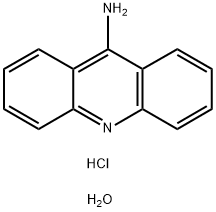
What is 9-Aminoacridine hydrochloride hydrate?
Chemical properties
yellow powder
The Uses of 9-Aminoacridine hydrochloride hydrate
9-Aminoacridine hydrochloride is a known mutagen and DNA modifier.
The Uses of 9-Aminoacridine hydrochloride hydrate
Mutagen.
What are the applications of Application
9-Aminoacridine hydrochloride is a known mutagen
General Description
Bright yellow to yellow-green powder.
Air & Water Reactions
9-Aminoacridine hydrochloride hydrate is sensitive to prolonged exposure to air . Slightly soluble in water.
Reactivity Profile
Materials in this group are generally soluble in water. The resulting solutions contain moderate concentrations of hydrogen ions and have pH's of less than 7.0. They react as acids to neutralize bases. These neutralizations generate heat, but less or far less than is generated by neutralization of inorganic acids, inorganic oxoacids, and carboxylic acid. They usually do not react as either oxidizing agents or reducing agents but such behavior is not impossible. Many of these compounds catalyze organic reactions.
Health Hazard
SYMPTOMS: Symptoms of exposure to 9-Aminoacridine hydrochloride hydrate include irritation of the gastrointestinal mucosa, nausea and vomiting.
Fire Hazard
Flash point data are not available for 9-Aminoacridine hydrochloride hydrate, but 9-Aminoacridine hydrochloride hydrate is probably combustible.
Purification Methods
Recrystallise it from boiling H2O (charcoal; 1g in 300 mL) to give pale yellow crystals with a neutral reaction. It is one of the most fluorescent substances known. At 1:1000 dilution in H2O it is pale yellow with only a faint fluorescence, but at 1:100,000 dilution it is colourless with an intense blue fluorescence. [Albert & Ritchie Org Synth Coll Vol III 53 1955; Falk & Thomas Pharm J 153 158 1944, Beilstein 22 H 463, 21 II 280, 21 III/IV 4174.] See previous entry for the free base.
Properties of 9-Aminoacridine hydrochloride hydrate
| Melting point: | 300 °C(lit.) |
| storage temp. | Store below +30°C. |
| solubility | 3.3g/l |
| form | powder to crystal |
| color | Light yellow to Yellow to Orange |
| Water Solubility | Soluble in water (3.3 g/L) at 20°C. |
| Sensitive | Hygroscopic |
| Merck | 14,407 |
| BRN | 3707637 |
| Stability: | Stable. Incompatible with strong oxidizing agents, strong bases, acid anhydrides. |
| CAS DataBase Reference | 52417-22-8(CAS DataBase Reference) |
| EPA Substance Registry System | 9-Aminoacridine hydrochloride monohydrate (52417-22-8) |
Safety information for 9-Aminoacridine hydrochloride hydrate
| Signal word | Danger |
| Pictogram(s) |
 Skull and Crossbones Acute Toxicity GHS06 |
| GHS Hazard Statements |
H301:Acute toxicity,oral |
| Precautionary Statement Codes |
P264:Wash hands thoroughly after handling. P264:Wash skin thouroughly after handling. P270:Do not eat, drink or smoke when using this product. P301+P310:IF SWALLOWED: Immediately call a POISON CENTER or doctor/physician. P405:Store locked up. P501:Dispose of contents/container to..… |
Computed Descriptors for 9-Aminoacridine hydrochloride hydrate
New Products
Tert-butyl bis(2-chloroethyl)carbamate (S)-3-Aminobutanenitrile hydrochloride N-Boc-D-alaninol N-BOC-D/L-ALANINOL N-octanoyl benzotriazole 3,4-Dibenzyloxybenzaldehyde 4-Hydrazinobenzoic acid Electrolytic Iron Powder 1,1’-CARBONYLDIIMIDAZOLE R-2-BENZYLOXY PROPIONIC ACID 4-HYDROXY BENZYL ALCOHOL 1,1’-CARBONYLDI (1,2-4 TRIAZOLE) S-2-CHLORO PROPIONIC ACID (2-Hydroxyphenyl)acetonitrile 4-Bromopyrazole 5-BROMO-2CYANO PYRIDINE 5,6-Dimethoxyindanone 5-broMo-2-chloro-N-cyclopentylpyriMidin-4-aMine 3-(2,4-Dimethoxybenzyl)dihydropyrimidine-2,4(1H,3H)-dione 6-Bromo-3-iodo-1-methyl-1H-indazole N-Boc-L-proline methyl ester 2-(BOC-Amino)4-picoline 1-(4-Methylphenylsulfonyl)-1H-1,2,3-benzotriazole 1-(2-Chlorobenzyl)-4-nitro-1H-pyrazoleRelated products of tetrahydrofuran
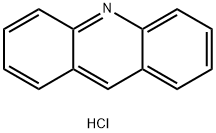
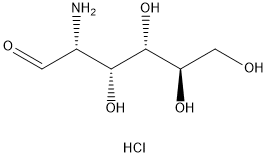


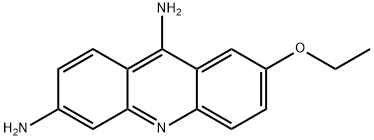
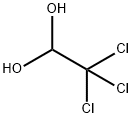


You may like
-
 9-Aminoacridine Hydrochloride Monohydrate CAS 52417-22-8View Details
9-Aminoacridine Hydrochloride Monohydrate CAS 52417-22-8View Details
52417-22-8 -
 9-Aminoacridine hydrochloride monohydrate CAS 52417-22-8View Details
9-Aminoacridine hydrochloride monohydrate CAS 52417-22-8View Details
52417-22-8 -
 9-Aminoacridine hydrochloride monohydrate CAS 52417-22-8View Details
9-Aminoacridine hydrochloride monohydrate CAS 52417-22-8View Details
52417-22-8 -
 Ste-Glu-AEEA-AEEA-OSUView Details
Ste-Glu-AEEA-AEEA-OSUView Details
1169630-40-3 -
 1446013-08-6 Fmoc-His-Aib-OH TFA 98%View Details
1446013-08-6 Fmoc-His-Aib-OH TFA 98%View Details
1446013-08-6 -
 127464-43-1 99%View Details
127464-43-1 99%View Details
127464-43-1 -
 2-ETHYLPYRIDINE 100-71-0 99%View Details
2-ETHYLPYRIDINE 100-71-0 99%View Details
100-71-0 -
 13162-05-5 99%View Details
13162-05-5 99%View Details
13162-05-5